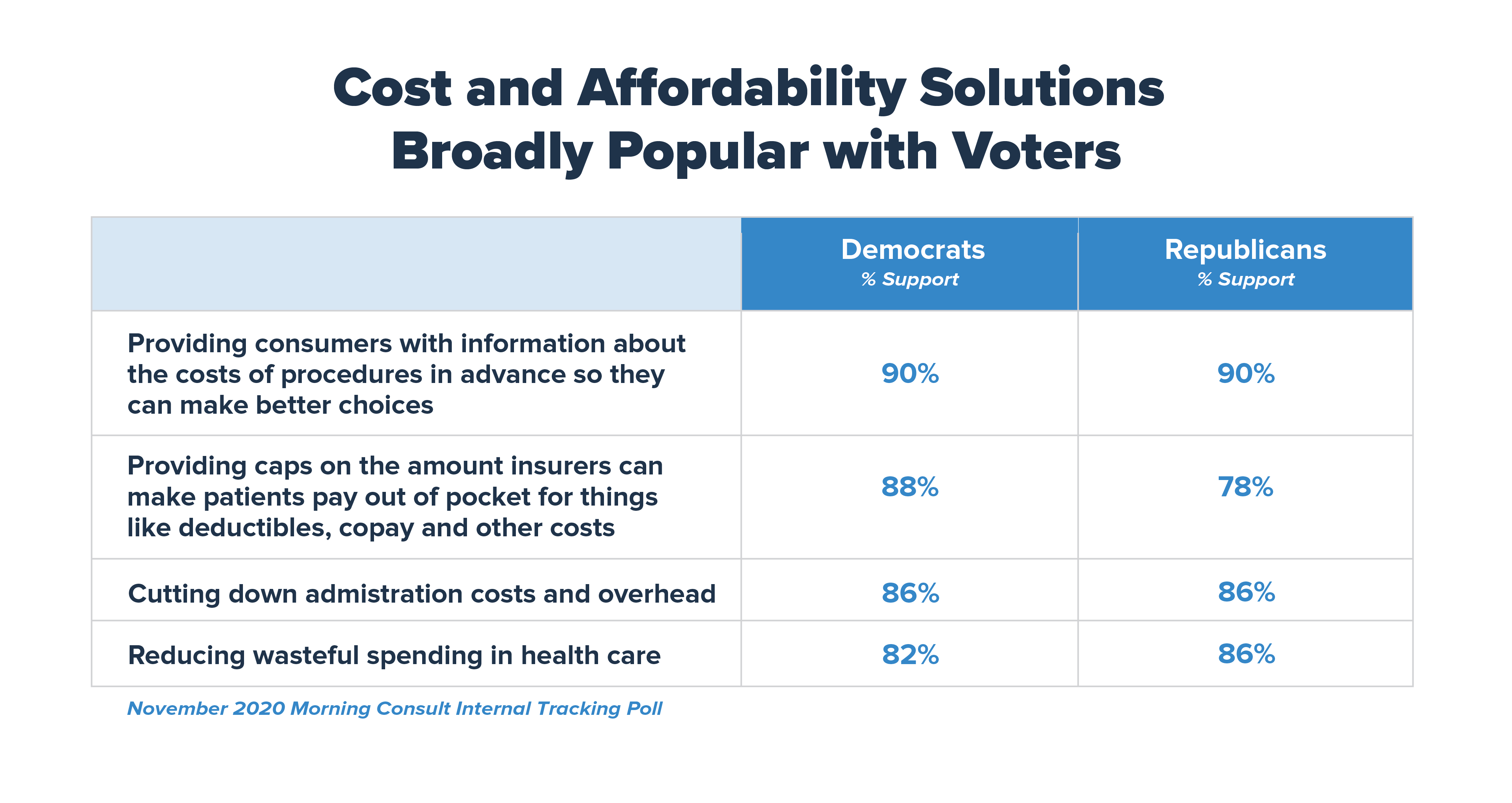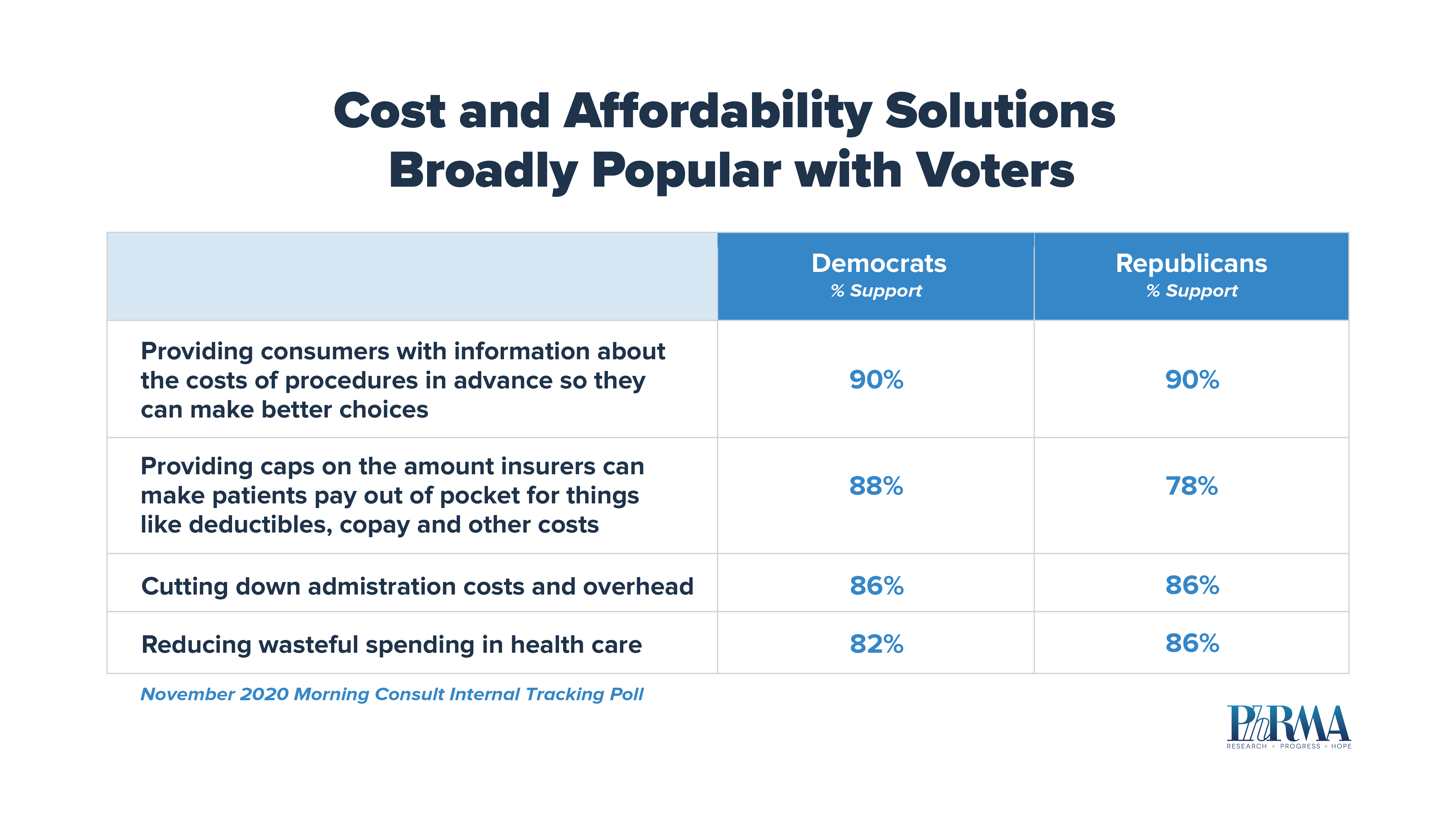We know from our insights on Election 2020 that COVID-19 was top-of-mind for Democrats and the economy was the key issue for Republicans, with Independents focused across both issues. But when looking at health care beyond the current pandemic, specific concerns were bipartisan – and largely centered on health insurance coverage, including protections for those with pre-existing conditions, as well as affordability of out-of-pocket costs.
While some third parties continue to publish polls that distract attention from the root causes of America’s affordability crisis, non-partisan public polling continues to show that voters are most concerned with the deterioration of their coverage and the corresponding rise in out-of-pocket costs for health care – from deductibles and co-pays to hospital services and prescription drugs.
As the Biden administration gets underway, voters across party lines are clearly calling for a concerted effort to advance coverage and affordability solutions. Today, we’ll look into these two areas more closely as well as potential solutions.
Coverage Concerns: As reflected in our November 2020 Morning Consult tracking poll, voters across political parties cite rising out-of-pocket costs and declining health insurance coverage among top concerns.
- Both Democrats and Republicans say that they are very worried about not having the coverage they need in the event of a major medical event (67% and 51%, respectively).
- Both Democrats and Republicans note pre-existing conditions protections are among their top three health care issues – further demonstrating concern about having quality coverage when needed. These voter concerns stem from the declining coverage American’s have dealt with over the past decade.
- According to IQVIA’s patient affordability case study, commercially insured patients with a deductible have seen their out-of-pocket costs for brand medicines increase 50% since 2014. And while retail prescription drug medicine prices declined by 0.4% on average in 2019, patients often don’t reap the benefits from lower prices because of our broken insurance system.
Affordability Concerns: Bipartisan concerns and opportunities extend to affordability of care.
- The same Morning Consult poll showed 45% of Democrats and 38% of Republicans report paying much or somewhat more out-of-pocket to cover health care expenses, such as copays, deductibles and premiums, compared with four years ago.
- Based on Kaiser Family Foundation’s 2020 Employer Health Benefits Survey, workers are paying $5,588, on average, toward the cost of their coverage. For workers covered by a plan with a general annual deductible, that annual deductible has increased 25% over the past 5 years – from $1,318 in 2015 to $1,644 in 2020.
- Additionally, annual premiums for employer-sponsored family health coverage reached $21,342 in 2020, which is up 4% from 2019. Paying for care is an area of worry, with Democrats and Republicans both concerned about going into debt to pay for medical expenses (64% and 50%, respectively).
Solutions: Democrats, Republicans and Independents alike agree that we need common sense solutions to address the most pressing health issues and make health care more affordable.
- A majority of both Democratic and Republican voters – 90% – support solutions that would provide consumers with information on the costs of procedures in advance so that they can make informed decisions about their care.
- Similarly, 88% of Democrats and 87% of Republicans support setting fair prices for services, like MRIs, so that charges don’t widely vary based on health care facility.
- Voters also called for reducing wasteful spending in health care, by eliminating unnecessary procedures and duplicate testing, and lowering administration costs. 82% of Democratic and 86% of Republican voters support reducing wasteful spending in health care. A similar number of voters (86% for both parties) strongly support cutting down administration costs and overhead to hold down rising premiums and out-of-pocket costs.

Bottom line: The 2020 Election underscored that Americans are aligned on the need for market-based solutions as well as solutions that ensure everyone has access to quality and affordable health care coverage. Voters from both sides of the aisle want policymakers to address their health care concerns around coverage and affordability. PhRMA remains committed to advocating for effective policies that advance solutions to meet Americans where they are.




